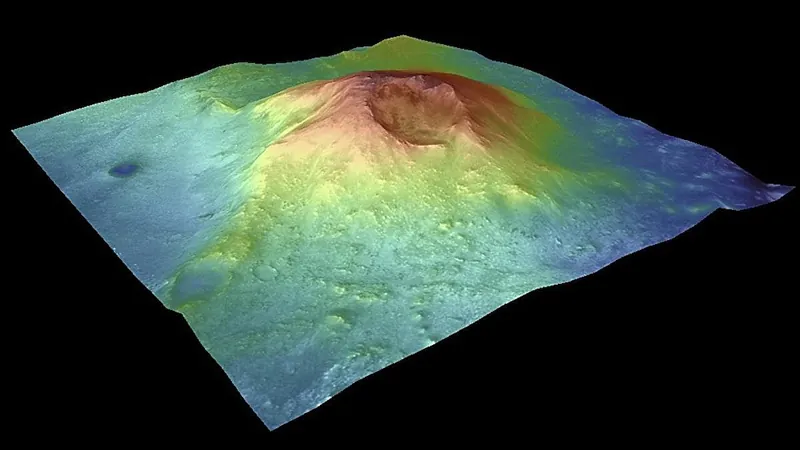
Hidden Volcano on Mars Could Reveal Secrets of Life and Geological History
2025-06-12
Author: Wei Ling
A Groundbreaking Discovery in Jezero Crater
In an exciting revelation, scientists from Georgia Tech have discovered that a striking mountain on the rim of Jezero Crater, the current site of NASA's Perseverance Rover mission, is likely a volcano. Dubbed Jezero Mons, this immense formation is nearly half the size of the crater itself and could unlock crucial insights into Mars' habitability and volcanic activity, reshaping our understanding of the planet's geological past.
Published Findings Transforming Mars Research
The findings, outlined in a study titled "Evidence for a composite volcano on the rim of Jezero crater on Mars," published in Communications Earth & Environment, highlight the wealth of information yet to be uncovered in one of Mars' most scrutinized regions. Lead researcher Sara C. Cuevas-Quiñones, who embarked on this endeavor during her undergraduate studies, emphasizes that the implications of volcanism on Mars stretch far and wide, impacting our perspective on life potential and the planet's geological timeline.
Unveiling Mars' Veiled Terrain
Professor James J. Wray, who first spotted the mountain back in 2007, described how the initial focus was on Jezero's fascinating water history until the volcanic elements emerged. "Imagine how many more volcanoes could be lurking across Mars if we're only now identifying this one!" Wray expounds, suggesting that the reality may be that volcanic activity is more widespread on the Red Planet than previously anticipated.
Delving Deeper into Mars' Secrets
After the Perseverance Rover landed, its discoveries of unexpected volcanic rocks prompted further investigations about Jezero Mons. Cuevas-Quiñones joined Wray and fellow researchers to analyze data from multiple Mars-observing spacecraft, establishing comparative characteristics with known volcanoes on Earth and Mars.
The Search for Past Life Intensifies
This volcanic discovery adds a captivating layer to the ongoing quest for ancient life on Mars. The proximity to Jezero Crater, a former lakebed, hints at a potential warming effect from volcanic activity, which could have provided the necessary energy for life to thrive in the planet's frigid atmosphere.
Unlocking the Geological Timeline
The intersection of sedimentary and igneous rocks at Jezero is a scientific goldmine. The ability to accurately date igneous rocks could serve as a valuable tool for calibrating age estimates of the crater's geology, offering unprecedented clarity into Mars' timeline.
A Bold Future for Mars Exploration
As Wray notes, this discovery positions Mars as the prime candidate in our solar system for signs of life. With Perseverance meticulously collecting samples from this key region, the potential for groundbreaking scientific breakthroughs awaits—if these samples make their journey back to Earth.



 Brasil (PT)
Brasil (PT)
 Canada (EN)
Canada (EN)
 Chile (ES)
Chile (ES)
 Česko (CS)
Česko (CS)
 대한민국 (KO)
대한민국 (KO)
 España (ES)
España (ES)
 France (FR)
France (FR)
 Hong Kong (EN)
Hong Kong (EN)
 Italia (IT)
Italia (IT)
 日本 (JA)
日本 (JA)
 Magyarország (HU)
Magyarország (HU)
 Norge (NO)
Norge (NO)
 Polska (PL)
Polska (PL)
 Schweiz (DE)
Schweiz (DE)
 Singapore (EN)
Singapore (EN)
 Sverige (SV)
Sverige (SV)
 Suomi (FI)
Suomi (FI)
 Türkiye (TR)
Türkiye (TR)
 الإمارات العربية المتحدة (AR)
الإمارات العربية المتحدة (AR)